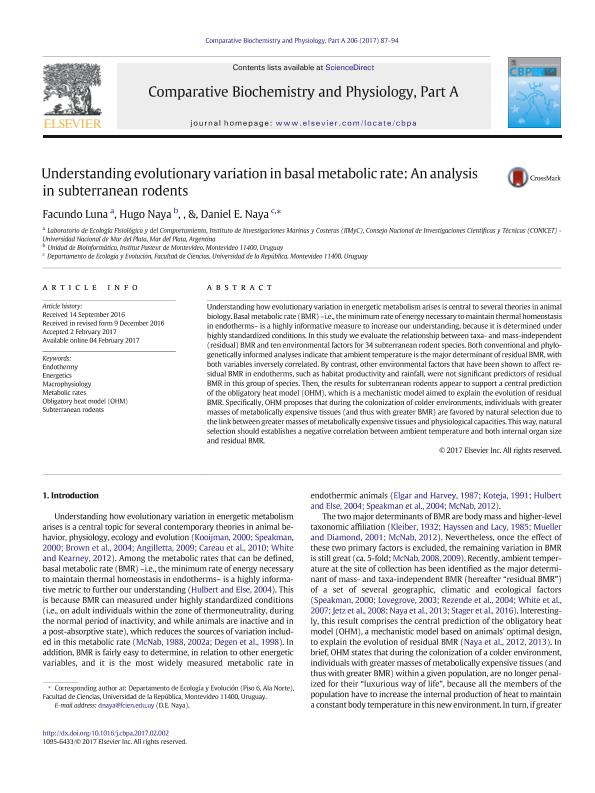Artículo
Understanding evolutionary variation in basal metabolic rate: An analysis in subterranean rodents
Fecha de publicación:
04/2017
Editorial:
Elsevier Science Inc
Revista:
Comparative Biochemistry and Physiology Part A: Molecular and Integrative Physiology
ISSN:
1095-6433
e-ISSN:
1531-4332
Idioma:
Inglés
Tipo de recurso:
Artículo publicado
Clasificación temática:
Resumen
Understanding how evolutionary variation in energetic metabolism arises is central to several theories in animal biology. Basal metabolic rate (BMR) –i.e., the minimum rate of energy necessary to maintain thermal homeostasis in endotherms– is a highly informative measure to increase our understanding, because it is determined under highly standardized conditions. In this study we evaluate the relationship between taxa- and mass-independent (residual) BMR and ten environmental factors for 34 subterranean rodent species. Both conventional and phylogenetically informed analyses indicate that ambient temperature is the major determinant of residual BMR, with both variables inversely correlated. By contrast, other environmental factors that have been shown to affect residual BMR in endotherms, such as habitat productivity and rainfall, were not significant predictors of residual BMR in this group of species. Then, the results for subterranean rodents appear to support a central prediction of the obligatory heat model (OHM), which is a mechanistic model aimed to explain the evolution of residual BMR. Specifically, OHM proposes that during the colonization of colder environments, individuals with greater masses of metabolically expensive tissues (and thus with greater BMR) are favored by natural selection due to the link between greater masses of metabolically expensive tissues and physiological capacities. This way, natural selection should establishes a negative correlation between ambient temperature and both internal organ size and residual BMR.
Archivos asociados
Licencia
Identificadores
Colecciones
Articulos(IIMYC)
Articulos de INSTITUTO DE INVESTIGACIONES MARINAS Y COSTERAS
Articulos de INSTITUTO DE INVESTIGACIONES MARINAS Y COSTERAS
Citación
Luna, Facundo; Anaya, Hugo Daniel; Naya, Daniel E.; Understanding evolutionary variation in basal metabolic rate: An analysis in subterranean rodents; Elsevier Science Inc; Comparative Biochemistry and Physiology Part A: Molecular and Integrative Physiology; 206; 4-2017; 87-94
Compartir
Altmétricas




